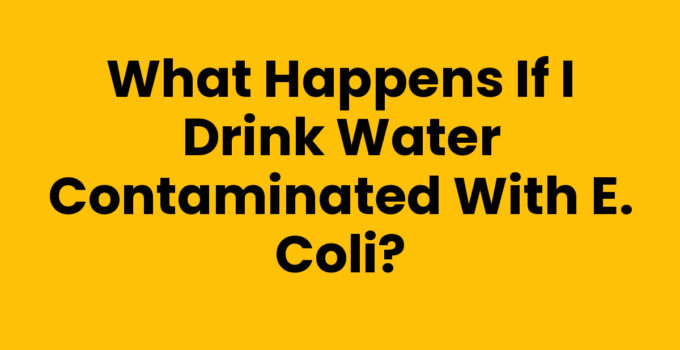Water is essential for life, but not all water is safe to drink. One of the hidden dangers lurking in contaminated water sources is Escherichia coli, commonly known as E. coli. This bacterium can cause serious health issues, and understanding what happens if you drink water contaminated with E. coli is critical for your safety. In this blog post, we will explore the implications of E. coli consumption, symptoms of infection, preventive measures, treatment options, and advice on seeking medical attention.
What Happens If I Drink Water Contaminated with E. coli?
If you consume water contaminated with E. coli, you may experience a variety of symptoms that indicate gastrointestinal distress. E. coli is a type of bacteria that usually lives in the intestines of healthy people and animals. While most strains are harmless, some can cause severe food poisoning. The active strains of E. coli can put you at risk for ailments ranging from mild upset stomach to severe dehydration or even more critical conditions if left untreated.
Recognizing the Symptoms
After drinking contaminated water, symptoms may appear within one to ten days. Common symptoms include:
- Abdominal cramps
- Diarrhea (which may be watery or bloody)
- Nausea and vomiting
- Low-grade fever
Symptoms can last anywhere from a few days to over a week, depending on the severity of the infection and the health of the person infected.
How E. coli Affects Your Body
When ingested, E. coli bacteria can latch onto the cells lining the intestines and begin to multiply. They release toxins that can damage the intestinal lining, causing inflammation and diarrhea. In some cases, particularly in vulnerable populations such as the elderly, young children, or those with weakened immune systems, E. coli can lead to hemolytic uremic syndrome (HUS), a serious condition that can result in kidney failure.
Steps to Take if You Suspect Infection
- Stay Hydrated: It’s crucial that you drink plenty of fluids to prevent dehydration from diarrhea and vomiting.
- Monitor Your Symptoms: Keep track of the severity and duration of your symptoms.
- Seek Medical Attention: Contact a healthcare provider if you experience severe symptoms, such as high fever, severe abdominal pain, or blood in your stool.
- Report the Incident: Inform local health authorities if you believe your illness is due to drinking contaminated water.
Taking these steps can mitigate health risks while ensuring you receive the appropriate care.
Further Reading: Step-by-Step Guide to the CUT Application in Bloemfontein
Preventing E. coli Contamination in Drinking Water
Understanding how to prevent exposure to E. coli is essential for maintaining good health. Here are some effective measures to minimize your risk:
- Boil Water: Boiling water for at least one minute can kill E. coli bacteria.
- Use Water Filters: Certain water filters can remove E. coli and other contaminants; ensure they are rated for pathogen removal.
- Regularly Test Water: If you get your water from a private well, test it annually for contaminants.
- Ensure Proper Hygiene: Wash hands thoroughly with soap and clean water before eating or preparing food.
Implementing these prevention strategies can help you and your family stay healthy and avoid E. coli infections.
You Might Also Like: Expert Roof Repair Bloemfontein: Your Complete Guide
Conclusion
In conclusion, drinking water contaminated with E. coli can lead to serious health issues, including gastrointestinal disease and potential kidney failure in severe cases. Recognizing symptoms early, staying hydrated, and seeking medical advice is vital if you experience any adverse effects. Taking preventive measures, such as boiling water and using filters, can significantly reduce your risk of exposure to harmful bacteria. Always prioritize your health by ensuring your drinking water is safe.
Read Also: Discover Naval Hill Bloemfontein: A Hidden Gem in South Africa
Frequently Asked Questions
What should I do if I feel sick after drinking contaminated water?
Stay hydrated, monitor your symptoms, and seek medical attention if they worsen.
Can E. coli infection be treated?
Yes, through hydration and medical care; however, antibiotics may not always be helpful.
How can I ensure my drinking water is safe?
Boil water, use quality filters, and test for contaminants regularly.



